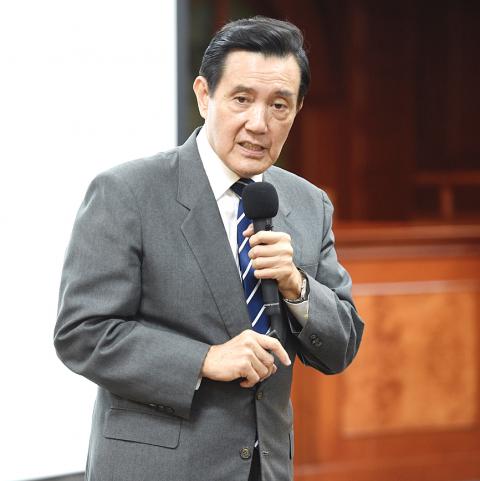Former president Ma Ying-jeou (馬英九) yesterday defended his statement that Taiwanese should not oppose unification, which he said is established by the Constitution.
Ma made the remark during a speech on cross-strait relations at Soochow University’s Chengzhong Campus in Taipei after a participant asked why Ma changed his “three noes” policy that underpinned cross-strait interactions during his eight-year presidency.
The “three noes” refers to Ma’s slogan of “no unification, no independence and no use of force.”

Photo: George Tsorng, Taipei Times
He on Nov. 7 revised his stance to “no opposition to unification” in a speech marking the third anniversary of his meeting with Chinese President Xi Jinping (習近平).
“Unification is a goal stipulated in our Constitution, but there is no timetable,” Ma said, adding that the process must be democratic and peaceful.
Ma said that he proposed the idea of “no opposition to unification,” because this was something that might happen, depending on the conditions and timing, and that he wanted to bring the issue to the attention of Taiwanese so that they could decide their own fate amid fluctuating cross-strait ties.
Regarding the so-called “1992 consensus,” Ma said that it is akin to a contract that has served as a political foundation for cross-strait ties.
“If you want to change it, it will need the consent of the other party. Otherwise it could jeopardize mutual trust across the Taiwan Strait,” he said.
Ma said the “consensus” was not fabricated by former Mainland Affairs Council chairman Su Chi (蘇起), but rather proposed by the Straits Exchange Foundation under the guidance of then-president Lee Teng-hui (李登輝) in November 1992 and accepted by the Chinese Association for Relations Across the Taiwan Straits.
The “1992 consensus” — a term Su in 2006 admitted making up in 2000 — refers to a tacit understanding between the Chinese Nationalist Party (KMT) and Beijing that both sides acknowledge there is “one China,” with each side having its own interpretation of what “China” means.
Beijing has never publicly endorsed the existence of the “different interpretations” element.
Ma also questioned President Tsai Ing-wen’s (蔡英文) policy of maintaining the cross-strait “status quo,” which Tsai said would remain unchanged, despite the Democratic Progressive Party’s losses in the Nov. 24 elections.
“Which ‘status quo’ is she referring to? The one under my administration or that under the administration of former president Chen Shui-bian (陳水扁)?” Ma asked, adding that Chen’s lacked the “1992 consensus.”

Taiwan is stepping up plans to create self-sufficient supply chains for combat drones and increase foreign orders from the US to counter China’s numerical superiority, a defense official said on Saturday. Commenting on condition of anonymity, the official said the nation’s armed forces are in agreement with US Admiral Samuel Paparo’s assessment that Taiwan’s military must be prepared to turn the nation’s waters into a “hellscape” for the Chinese People’s Liberation Army (PLA). Paparo, the commander of the US Indo-Pacific Command, reiterated the concept during a Congressional hearing in Washington on Wednesday. He first coined the term in a security conference last

Prosecutors today declined to say who was questioned regarding alleged forgery on petitions to recall Democratic Progressive Party (DPP) legislators, after Chinese-language media earlier reported that members of the Chinese Nationalist Party (KMT) Youth League were brought in for questioning. The Ministry of Justice Investigation Bureau confirmed that two people had been questioned, but did not disclose any further information about the ongoing investigation. KMT Youth League members Lee Hsiao-liang (李孝亮) and Liu Szu-yin (劉思吟) — who are leading the effort to recall DPP caucus chief executive Rosalia Wu (吳思瑤) and Legislator Wu Pei-yi (吳沛憶) — both posted on Facebook saying: “I

Sung Chien-liang (宋建樑), who led efforts to recall Democratic Progressive Party (DPP) Legislator Lee Kun-cheng (李坤城), was released on bail of NT$80,000 today amid outcry over his decision to wear a Nazi armband to questioning the night before. Sung arrived at the New Taipei District Prosecutors’ Office for questioning in a recall petition forgery case last night wearing a red armband bearing a swastika, carrying a copy of Adolf Hitler’s Mein Kampf and giving a Nazi salute. Sung left the building at 1:15am without the armband and covering the book with his coat. Lee said today that this is a serious

Firefighters are working to put out a fire on Taipei’s Yangmingshan (陽明山) reported earlier this morning. The cause of the fire is still under investigation. The Taipei Fire Department said it received a report of a fire at Xiaoyoukeng (小油坑) at 11:17am, dispatching four command vehicles, 16 firetrucks, one ambulance and 72 personnel. The fire is still burning on about 250m² of land, according to initial estimates, as eyewitnesses reported seeing smoke rising from the mountain. The Yangmingshan National Park Headquarters on Facebook said the Qixingshan (七星山) hiking trail starting from Xiaoyoukeng and the Xiaoyoukeng parking lot are closed as firefighters work to put